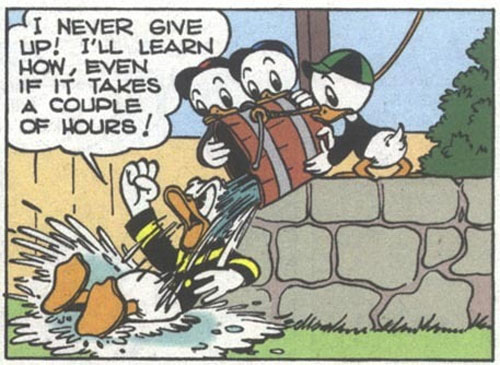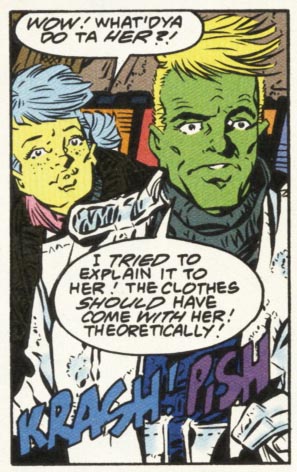
14
Apr
The single best panel in comics history.
Posted by MGK Published in Brainiac Five Is Awesome, Comics
10
Apr
Every Thursday, mightygodking.com returns to the pages of Who’s Who, the classic 1980s DC comic book encyclopedia of their characters. Every week, a character shall be judged on the only scale scientific enough that matters: the Rex The Wonder Dog scale of fantasticosity.

Why? Because he is a super-powered Stalin lookalike.
Now, admittedly, this is not quite as cool as a Russian graduate student with no powers who idolizes Stalin and uses Stalin’s image to commit crimes, or the actual Stalin himself as a sorcerer fighting Black Magic Hitler. (And, curiously, with a bit of a speech impediment.) But Stalnoivolk is pretty damn cool, even if he is not at the apex of coolness.
I mean, he does all his supering in a nice suit. Don’t we all often wish that more superheroes just did their jobs while wearing nice suits? After seeing a number of Marvel movies, you begin to appreciate that tights look kind of silly sometimes, and not everybody has to wear them. So let’s give praise to Stalnoivolk for wearing a nice three-piece.
However, Stalnoivolk has also met up with Deadshot, and indeed been out-badassed by Mr. Floyd Lawton. While this is no great crime (after all, being out-badassed by Deadshot is pretty common, because Deadshot is totally badass), it does mean that when assessing Stalnoivolk’s rating, we have to take into account that he is definitely below Deadshot’s tier.
Thus:

9
Apr
Back in the mid-90s, Marvel had what I thought was the very clever practice of printing on the inside front cover of every issue of every ongoing comic a mini-introduction to the comic – quick blurbs for each of the cast, a short synopsis of what was currently going on in the comic, what happened last issue, et cetera.
Why don’t they do that any more? Why doesn’t DC do it, for that matter? I understand sacrificing potential ad space is a bother, but now that all the pages of a comic are printed on glossy paper (which I dislike, incidentally, but that is neither here nor there), there’s no functional difference between the inside front cover ad space and an additional page of ads elsewhere in the comic. (And it’s not like Marvel and DC are particularly shy about putting additional pages of ads inside the comic.)
Moreover, the inside front cover space is probably the least-read ad page in the comic anyway, because it’s the part you can automatically skip just to get to the good stuff, IE, the story. If there’s a part of the comic’s ad landscape you can reasonably sacrifice, it’s that page.
And a “previously” page just makes sense. It makes the book easier to read for a casual reader. (Imagine how much simpler Secret Invasion would be to read with a “Previously in the Marvel Universe” blurb on the inside front cover. Okay, only a little for that particular book, but even so, it would be more comprehensible to somebody who didn’t know what was going on.) I chose the title of this post for a reason: complex shows like Lost, with large casts and multiple subplots running at any one time (which is something like, for example, any superhero team book ever printed) like to help even regular viewers remember what’s happened before that’s important.
So why don’t the Big Two do this?
8
Apr
It could be worse.
Posted by MGK Published in Bad Comedy, Comics, Dr. Doom Loves My Little Pony, Photoshopp'dRecently the internet has gotten in a tizzle over Brian Michael Bendis’ dialogue for Dr. Doom in Mighty Avengers. Like so:
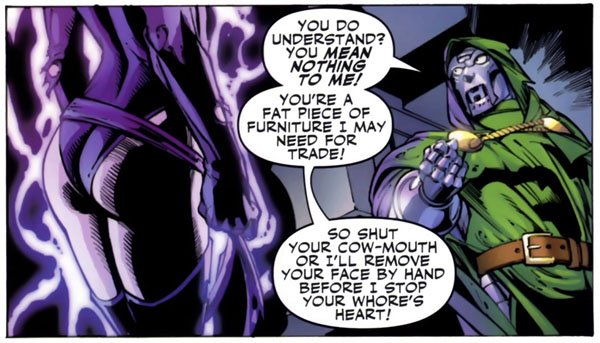
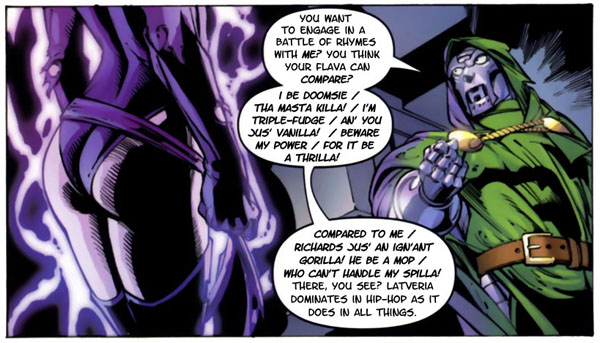
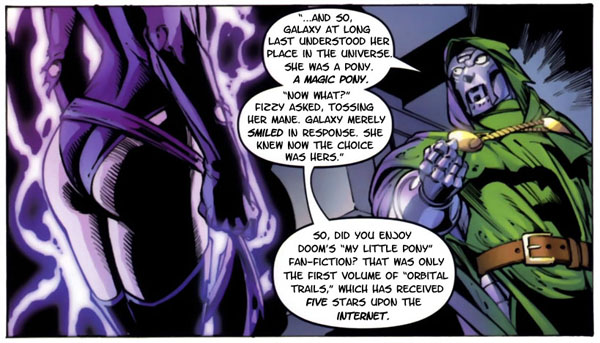
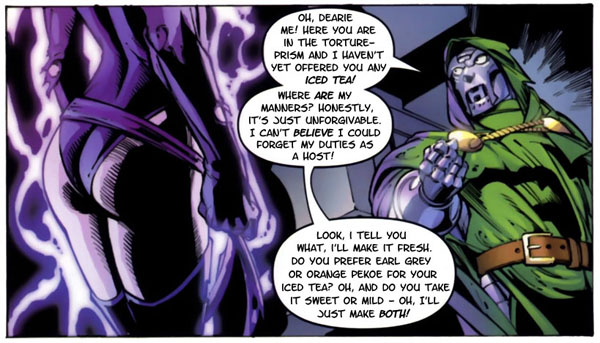
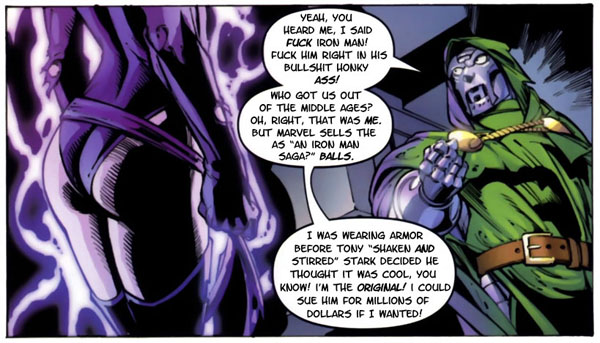
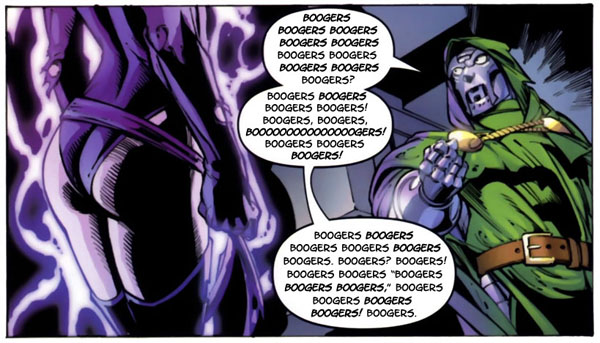
7
Apr
I Should Really Just Have A “Newsarama Commenters Miss The Point” Weekly Feature
Posted by MGK Published in Comics, The InternetsMike Manley says what’s obviously true – that fanboys complaining about the new all-ages Brave and the Bold cartoon show (which has Jaime Reyes in it! How is that not fantastic?) are products of a skewed direct-market fan environment that caters to their needs over the legion of younger fans just waiting to be introduced to the awesomeness that is Batman.
And commenters unknowingly confirm his point for all to see.
4
Apr
DEAR MR. PAUL LEVITZ:
1.) I demand you immediately reprint the following in hardcover collections with exactly the type of paper I like: Wild Dog, Lords of the Ultra-Realm, the “Injustice, Unlimited” arc in Infinity Inc. which had early Todd McFarlane art, every appearance of Stalker, and a Barbie Adventures Omnibus. If you do not reprint this material immediately, it will be obvious to all and sundry that you are totally unfit to run DC Comics.
2.) Related to my first question, I am unhappy with the gigantic Omnibus editions you have printed thus far because I have issues with the quality of paper you used. Please reprint these Omnibus editions with better paper. I have already spent a lot of money on them, but I will spend much more for ones with the proper paper! Also, please make more busts of your characters posing dramatically, and perhaps a statue of Wonder Woman bending over to wash Batman’s underwear.
3.) Since you once wrote Legion of Super-Heroes and I really liked it back when I was ten, it thus follows logically that nobody else can write Legion of Super-Heroes, especially that johnny-come-lately hack Jim Shooter. Please find time in your busy schedule to write this comic again, also returning the status quo of the title back to the way it was when I was young. I am sure this will create excitement among new readers for reasons upon which I will not elaborate.
4.) What do you think the future of comics is? Please keep your answer down to two sentences or less. No big words.
5.) BRING BACK HAWKMAN! The Hawkman I liked! Not this other Hawkman! I will not specify further, because you know what I mean and Hawkman’s appeal is obvious and undying.
(Worst actual quote from the comments: “I’m a big fan of Absolute Editions. For one thing they save me needing to go to a gym!” No, sir, they probably don’t. Go to a gym.)
3
Apr
Every Thursday, mightygodking.com returns to the pages of Who’s Who, the classic 1980s DC comic book encyclopedia of their characters. Every week, a character shall be judged on the only scale scientific enough that matters: the Rex The Wonder Dog scale of fantasticosity.
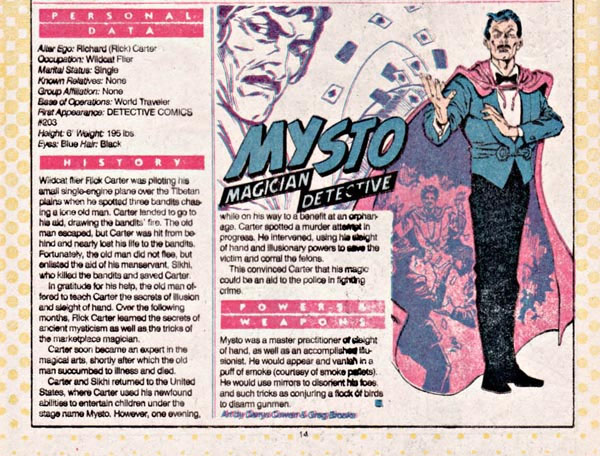
And then he lands in Tibet and saves a swami sort of person from bandits (well, tries to save – note that Mysto’s general aura of sheer pathos starts early), who teaches him ancient mysticism and sleight of hand. Not actual magic, you understand, in the bibbity-bobbity-boo Harry Potter/Merlin/turning you into a frog sense. The swami teaches him parlour tricks. Which, we would point out, makes this Tibetan guru in the hills quite possibly the lamest wise old hermit in the entire history of comics and quite possibly all fiction ever.
So Mysto returns to civilization when the swami dies, and stops being a bush pilot and instead becomes a children’s magician. Not even a nightclub magician: his magical skills are good enough to fool kids. So he’s not even that good a magician.
All of which leads him to conclude that his mastery of second-degree prestidigitation would best be used to fight crime.
Again: this is the DC Universe (well, early on in it to be sure, but it’s not like there weren’t actual magical characters in the Golden Age). And he’s planning to fight crime with fucking card tricks.

2
Apr
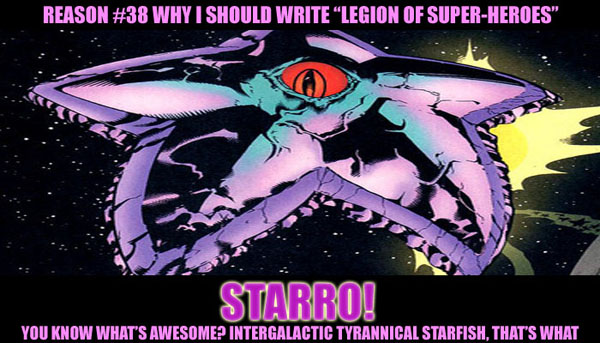
Blame Greg Morrow for this one, and I’ll just quote him in the email he sent me:
You should write a “Why I should write LSH” about Starro. Pro or con. The Star Conqueror lies at the heart of DC Comics’ appeal, viz., it’s an adorably goofy idea that you can’t explain to a non-comics-reading adult without apologizing, but at the same time is amazingly effective and terrifying when played straight. (I’ve argued the same about Modok.)
What attracts me to the idea is that Starro is an alien invader. He’s intrinsically more SFnal than the usual run of supervillain, and the LSH should be more SFnal than the usual run of superhero comic. He’s also not a bumpy-forehead alien like the Khunds or the Skrulls, and, as Grant Morrison exploited, that makes him potentially a lot more alien, harder to understand and come to grips with as an antagonist, and therefore just plain scarier.
Greg is dead on with all of this, and until he mentioned something else in his email – namely, that we have no idea where Starro(s) come from – well. I’ll tell you the truth.
I’d considered Starro previously as an LSH villain, and dismissed him.
Not because I don’t love Starro. Starro is awesome. He is an evil space-traveling starfish. You don’t get more comics than that. But the problem with Starro is that the single most primal story from a comics standpoint that involves Starro – namely, that he takes over some of the superheroes and then the superheroes have to fight each other, Starro-controlled hero against still-independent hero – has been done quite a lot, and a new take on it has to be really brilliant, and I couldn’t think of one. Brad Meltzer did the “miniature Starros as mind-control agents” bit in his year on Justice League, so that’s out too.
And then Greg pointed out that we don’t know where Starro comes from, and that’s when I got the idea.
Why does Starro want to conquer, anyway? I mean, Starro is most terrifying when he’s so utterly fucking alien in motivation that he doesn’t bother explaining why he’s mind-controlling everybody with his starfish spawnlings. He just does it. Why would he do that?
Maybe it’s a biological imperative. Maybe Starro and/or his race feed off psychic emanations. A Starro creates the starfish spawn to serve much like tiny little suction cups. The mind-control evolved over time. First it was just a defense mechanism to keep people from tearing off the spawn, but it got finer and more astute over time, and then one day the Starros started getting smarter, and smarter, and smarter as they kept absorbing all that brain-juice, until they achieved sentience, and they realized that this was only the beginning.
Of course, Starro isn’t stupid, and probably after his nth asskicking at the hands of Earth superheroes he realized that straight-up conquest just wasn’t going to work. But here’s the thing about essentially immortal starfish: they can afford to play the long game.
Imagine a world, way off in a quiet corner of space, where Starro lives peaceably with an intelligent humanoid population. It’s a symbiotic relationship, much like the Trills in Star Trek. Starro gets to eat brain-energy, but in return he makes his hosts stronger, faster, healthier (and not everybody on the planet gets to be a host – the race considers it a privilege to carry a spawnling). A plain, quiet, orderly little world, polite and friendly – except over time Starro has become the absolute leader, and worse, he doesn’t have to force anybody this time around to let him be in charge. Think how goddamned creepy it would be.
A world where dissidents are punished – for their own good, of course, your loved ones will drag you to a faceful of starfish themselves if they have to, because they know it’s the best thing for you – with aggressive Starro therapy. (Dissidents tend to have more agitated brains. Nothing like a little Starro to sort that out and calm them down.) A world where every policeman has a starfish on his face that shoots a stun-ray from its central eye. A world where people compete for Starro’s attention.
This is a Starro who thinks beyond simple tactics like “take over everything in sight, then take over more things, then more, then more.” This is a Starro that’s figured out how to achieve his ultimate objective – soft tactics rather than hard force. The ultimate face of starfish fascism, brought about the way all good fascism is – entirely voluntarily.
And what is Starro’s ultimate objective? Why does he want to conquer everything, anyway?
Well, I can’t give it away for free, you know? 🙂
1
Apr
“Veronica Lodge And The Gay Men”
Posted by MGK Published in Archie (Improved Or Otherwise), Bad Comedy, ComicsThanks to Karen, I have fresh Archie to analyze today!
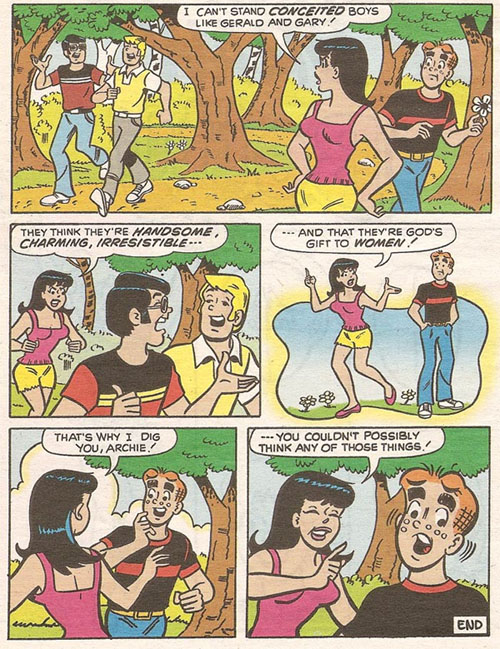
Also, they scrapbook.
But Veronica, naturally, is so self-obsessed that she doesn’t get this at all, even though Gary and Gerald went to prom together and told everybody they were going “stag” and then didn’t dance with any girls at all for the entire night, even when they requested “that we get some happy hardcore going up in this soiree” – and turns her vitriol on Archie because subconsciously she hates herself and the way she dresses.
(This is another reason for her anger at Gerald and Gary; deep down, she resents them because they will not go clothes shopping with her. Despite being wealthier than Midas, Veronica does not have much clothes sense, which explains why she is wearing a trashy pink halter top and yellow cutoffs in this strip, and why routinely she wears either tasteless, flashy outfits that detract from her natural good looks or her misguided and frankly pathetic attempts to ape Betty’s classic all-American-teenaged-girl look.)
That is the delicious irony of the strip: Veronica thinks she is making a witty and cutting observation, knocking Archie down to size, when in fact she is unknowing reaffirming the power of his heterosexuality through her attempted evil words.
Archie, in turn, is so blown away both by Veronica’s malice and by the backwards nature of her accidental compliment that his head twists around like he is Linda Blair in The Exorcist.
And that is what happens in this strip.
1
Apr
I’ve seen the sentiment expressed elsewhere that Paul Levitz has been personally involved in attempting to keep the Siegel estate from collecting their share of Superman’s copyright.
Let me say without even the slightest reservation that this is crap. Greg Morrow details how Levitz was personally involved in seeing that DC increased Siegel and Shuster’s pension back in the 70s here, and I’ll second his declaration that Levitz is a real mensch.
Yes, I have said previously that DC Comics are, collectively, being moneygrubbing assholes as regards the Siegels. But that’s a corporation, a legal fiction determined by fiat to be psychopathic in its intent to collect funds, and more importantly not even an independent one but rather a small wing of a media empire. There is a difference between saying that DC Comics are being assholes and saying that Levitz is being an asshole; for example, the former is true and the latter is not. Levitz has very little say in how corporate policies are executed; DC Comics’ policy regarding protection of its properties isn’t his to dictate.
Moreover, I’d like to go into Sharing Time for a second, and mention how, back when I was doing the original I Should Write The Legion series on my old Livejournal, a friend of mine called up Paul Levitz (whom he knew through old-school fan channels) and suggested we talk, if only to give me some insights into the business end of comics. And that’s how I came to have a hour-plus phone call, uninterrupted, with the managing director of DC Comics, on a weekday morning. The fact that Paul Levitz almost certainly had better and/or more important things to do than talk with a nigh-total nobody like me never even entered into the conversation at all.
That’s because Levitz is a good guy. And I just wanted to make that clear.
30
Mar
Okay.
Look, I get that comics fans, if there is even the slightest hint of having their precious weekly comic flow interrupted, will throw a collective hissy, not unlike a three-year-old who has not yet gotten his juice. (Actually, this is unfair. Juice is a lot more important than comics are.) And I understand that a lot of comics fans have the legal sense of your average groundhog.
But, for the life of me, I don’t understand this argument, which I have seen advanced numerous times around the internets:
“Siegel and Shuster’s heirs do not deserve to control the rights to Superman, because they had nothing to do with his creation.”
See, that first part is fine. It’s a perfectly reasonable – if someone brutal – argument for expiry into the public domain upon creator’s death, and I actually agree with the general thrust of it, seeing as how I think public domain rights are being steadily trampled in favor of corporations. The problem is that the unspoken (or, hell, even spoken) corollary of this argument is:
“DC Comics deserves to control the rights to Superman.”
There is nobody working at DC Comics today who was involved in the development of the key elements of Superman, you know. Not a one. They’re all dead, or extremely, extremely retired. I can understand the argument that the Siegel estate doesn’t deserve a share of Superman at this point; the co-argument that a legal fiction does, however, completely contradicting the basis of the first argument, is just stupid.
29
Mar
Superman Never Made Any Money (Except When He Did)
Posted by MGK Published in Comics, Intellectual Property, LawThe decision came down yesterday that the estate of Jerry Siegel has won the copyright to Superman – specifically, “all Superman material in Action Comics #1.” I’ve already seen in a few places people worrying about how this may BANKRUPT THE COMICS INDUSTRY BY SETTING A PRECEDENT!!!!one!!1! Or, more amusingly, the legion of retards commenting on the Newsarama blog getting indignant that the Siegel estate is trying to “destroy Superman” and that Siegel and Shuster’s estates are simply greedy bastards trying to steal money rightfully not theirs.
(Inevitably, whenever Newsrama posts a legal story, it gets a shitload of comments. Equally inevitably, the level of ignorance from people who think the law is just as simple to define as a Green Lantern power ring’s weakness is displayed in full force.)
Don’t worry. The implications are smaller than you think. The decision – which, incidentally, is really quite readable for non-lawyers – can be found here.
The core of the Siegel lawsuit is that Siegel and Shuster created Superman before they began working for DC. (He was originally intended for a comic strip, but they decided to sell him to DC for publication later.) Changes to the United States Copyright Act in the mid-70s gave creators one-time rights to request control of copyrighted works they sold in the years prior (on the basis that, given the change in copyright law – notably the extension for which works remained in private domain – they might have chosen not to sell). The Siegel case has been an example of this sort of attempted recursion.
The Superboy and Superman lawsuits over the past twenty-plus years have been (and this is personal opinion, having studied the case previously) basically one long case of DC Comics being moneygrubbing assholes, because on the merits of the case Siegel had this one in the bag (Shuster has a tougher case due to some contractual issues), and DC/Time-Warner have simply been fighting a stall game for as long as possible on the basis that the $1 billion (yes, billion) per year Superman franchise generated more money than it cost them to pay lawyers to stall.
In terms of implications for the comic industry as a whole – not much, because this isn’t a landmark decision or anything. Most of the major contentious or potentially contentious work-for-hire properties have been settled by contract or established in caselaw – Joe Simon on Captain America, Bill Kane on Batman, etc. (Maybe Steve Gerber’s estate can make a case for Howard the Duck, as I’ve heard he invented the concept independently of Marvel, but for most properties in comics it will generally be very hard to prove that the work was not created on a work-for-hire basis, if not contractually invalidated right from the get-go.)
In terms of the implications for Superman, they too are less than you think. Yes, the Siegel estates now control, to an extent, the copyright of Superman, but copyright for most of Superman’s fellow-concepts – such as Jimmy Olsen, Lex Luthor, Metropolis, The Daily Planet, et cetera – rest firmly in DC’s hands. (Copyright in this regard is a bitch to navigate – Superman’s copyright covers his relationships with the aforementioned, but not necessarily the aforementioned. Lois Lane, who unlike most of the Superman mythos first appeared in that fateful first issue of Action Comics, may fall to the Siegels.) More importantly, DC Comics completely controls and owns the trademarks for Superman – the big red S, the curvy-text Superman logo, the costume, and so forth. Siegel’s estate is not going to take Superman away from DC; it’s functionally impossible to do so until Big Blue passes into the public domain, which won’t be for about another twenty years (barring another corporate-inspired extension of private domain rights, of course).
The major point is that Siegel’s estate will now be owed back pay, I believe, on their rights as owners of the Superman copyright – the amount of which, of course, be contested by DC as well, and on reasonable grounds (namely the “look, we did all the work for all those years” argument, which is not invalid). Also note that DC retains exclusive control of Superman’s international copyright – the Siegel decision merely reflects domestic copyright.
However, DC will have to start forking over monies generated by Superman, most notably those from Smallville – prior to this decision, DC was holding out that Smallville was a show about a “young Superman” rather than “Superboy,” to evade paying the Siegels their share of profits from the show in the wake of the decision that put the rights to Superboy in the hands of the Siegels last year. The point, obviously, is now moot. Of course, they won’t fork over everything, because DC is responsible for producing the show and the Siegel estate doesn’t want to bother with that work. It’ll be a straight-up profit-sharing deal.
Of course, maybe DC will just change his costume. Then again, we know how well that worked out the last time they tried it.
28
Mar
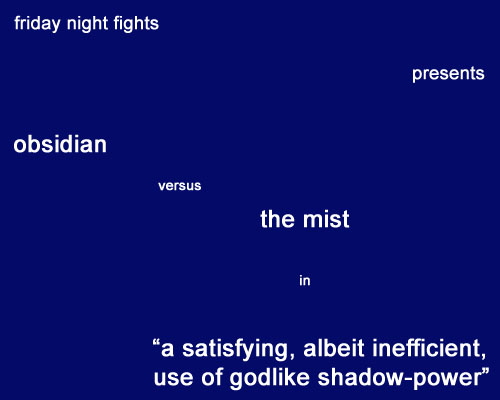
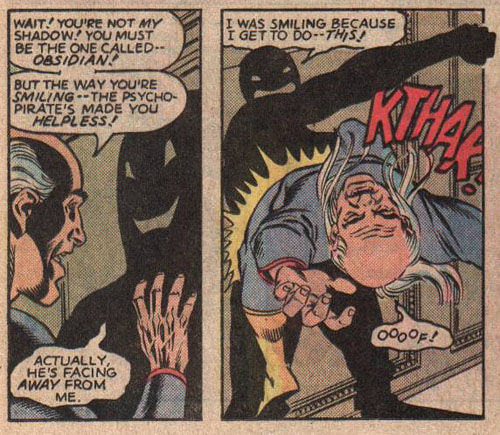
Bahlactus is the velvet hammer, soft yet rugged.
27
Mar
Every Thursday, mightygodking.com returns to the pages of Who’s Who, the classic 1980s DC comic book encyclopedia of their characters. Every week, a character shall be judged on the only scale scientific enough that matters: the Rex The Wonder Dog scale.
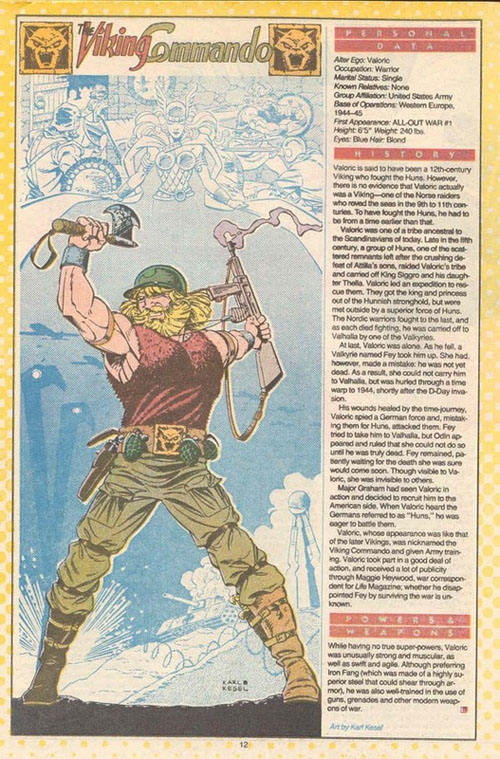
1.) Honestly, why DC have not brought back Viking Commando in some form is beyond me. He is a Viking who fights Nazis. Do I need to repeat that? A Viking who fights Nazis. I’m just going to say it again in case the pure cool factor has not sunk into someone’s brain here: a Viking who fights Nazis.
2.) The following are the lyrics to the theme song from the shortlived Japanese television series adaptation (title loosely translated: “Ancient Mighty Beard Warrior Versus Magic Hitler Dream Army”)
VIKING COMMANDO
VIKING COMMANDO
HE’S A NORMAL VIKING MAN TRANSPORTED FORTH IN TIME TO FIGHT THE HUNS
HE’S ARMED WITH A VIKING AXE THAT SOMEHOW BEATS PEOPLE WHO HAVE GUNS
VIKING COMMANDO
VIKING COMMANDO
HE WILL TOTALLY FUCK YOUR SHIT UP WITH HIS EIGHTH-CENTURY NORDIC WAYS
AND SOMEHOW HE KNOWS MODERN ENGLISH, NOW DOES THAT NOT AMAZE
VIKING COMMANDO
VIKING COMMANDO
3.) Valoric (IE, the Viking Commando) was originally going to be the star of The 13th Warrior until Antonio Banderas made it big. Then Antonio Banderas became somewhat less big in a hurry and the movie studios felt very, very stupid.
4.) Did anybody else notice that according to the writeup – that the Viking Commando, a warrior without peer, can’t die until he’s killed in battle? What happens if he can’t find someone capable of killing him in battle? Doesn’t that make him technically immortal? Damn, now I have to do a “I Should Write The Legion” where he shows up. The only thing better than a Viking with an axe and a machine gun is a Viking with an Atomic Axe and a psionic ray blaster.
5.) You just know he totally nailed Mademoiselle Marie at some point.
And the tale of the tape is…

Because he is a Viking who fights Nazis.
Search
"[O]ne of the funniest bloggers on the planet... I only wish he updated more."
-- Popcrunch.com
"By MightyGodKing, we mean sexiest blog in western civilization."
-- Jenn
Contact
MGKontributors
The Big Board
MGKlassics

Blogroll
- ‘Aqoul
- 4th Letter
- Andrew Wheeler
- Balloon Juice
- Basic Instructions
- Blog@Newsarama
- Cat and Girl
- Chris Butcher
- Colby File
- Comics Should Be Good!
- Creekside
- Dave’s Long Box
- Dead Things On Sticks
- Digby
- Enjoy Every Sandwich
- Ezra Klein
- Fafblog
- Galloping Beaver
- Garth Turner
- House To Astonish
- Howling Curmudgeons
- James Berardinelli
- John Seavey
- Journalista
- Kash Mansori
- Ken Levine
- Kevin Church
- Kevin Drum
- Kung Fu Monkey
- Lawyers, Guns and Money
- Leonard Pierce
- Letterboxd – Christopher Bird - Letterboxd – Christopher Bird
- Little Dee
- Mark Kleiman
- Marmaduke Explained
- My Blahg
- Nobody Scores!
- Norman Wilner
- Nunc Scio
- Obsidian Wings
- Occasional Superheroine
- Pajiba!
- Paul Wells
- Penny Arcade
- Perry Bible Fellowship
- Plastikgyrl
- POGGE
- Progressive Ruin
- sayitwithpie
- scans_daily
- Scary-Go-Round
- Scott Tribe
- Tangible.ca
- The Big Picture
- The Bloggess
- The Comics Reporter
- The Cunning Realist
- The ISB
- The Non-Adventures of Wonderella
- The Savage Critics
- The Superest
- The X-Axis
- Torontoist.com
- Very Good Taste
- We The Robots
- XKCD
- Yirmumah!
Donate
Archives
- August 2023
- May 2022
- January 2022
- May 2021
- January 2021
- December 2020
- October 2020
- June 2020
- March 2020
- January 2020
- December 2019
- October 2019
- February 2019
- January 2019
- December 2018
- April 2018
- March 2018
- February 2018
- January 2018
- December 2017
- November 2017
- October 2017
- February 2017
- January 2017
- December 2016
- November 2016
- October 2016
- September 2016
- August 2016
- July 2016
- June 2016
- May 2016
- April 2016
- March 2016
- February 2016
- January 2016
- December 2015
- November 2015
- October 2015
- September 2015
- August 2015
- July 2015
- June 2015
- May 2015
- April 2015
- March 2015
- February 2015
- January 2015
- December 2014
- November 2014
- October 2014
- September 2014
- August 2014
- July 2014
- June 2014
- May 2014
- April 2014
- March 2014
- February 2014
- January 2014
- December 2013
- November 2013
- October 2013
- September 2013
- August 2013
- July 2013
- June 2013
- May 2013
- April 2013
- March 2013
- February 2013
- January 2013
- December 2012
- November 2012
- October 2012
- September 2012
- August 2012
- July 2012
- June 2012
- May 2012
- April 2012
- March 2012
- February 2012
- January 2012
- December 2011
- November 2011
- October 2011
- September 2011
- August 2011
- July 2011
- June 2011
- May 2011
- April 2011
- March 2011
- February 2011
- January 2011
- December 2010
- November 2010
- October 2010
- September 2010
- August 2010
- July 2010
- June 2010
- May 2010
- April 2010
- March 2010
- February 2010
- January 2010
- December 2009
- November 2009
- October 2009
- September 2009
- August 2009
- July 2009
- June 2009
- May 2009
- April 2009
- March 2009
- February 2009
- January 2009
- December 2008
- November 2008
- October 2008
- September 2008
- August 2008
- July 2008
- June 2008
- May 2008
- April 2008
- March 2008
- February 2008
- January 2008
- December 2007
- November 2007
- October 2007
- September 2007
- August 2007
- July 2007
- February 2007
Tweet Machine
- No Tweets Available
Recent Posts
- Server maintenance for https
- CALL FOR VOTES: the 2021 rec.sport.pro-wrestling Awards
- CALL FOR NOMINATIONS: The 2021 rec.sport.pro-wrestling Awards (the Theszies)
- The 2020 RSPW Awards – RESULTS
- CALL FOR VOTES: the 2020 Theszies (rec.sport.pro-wrestling Awards)
- CALL FOR NOMINATIONS: The 2020 Theszies (rec.sport.pro-wrestling awards)
- given today’s news
- If you can Schumacher it there you can Schumacher it anywhere
- The 2019 RSPW Awards – RESULTS
- CALL FOR VOTES – The 2019 RSPW Awards (The Theszies)
Recent Comments
- George Leonard in When Pogo Met Simple J. Malarkey
- Blob in How Jason Todd Went Wrong A Second Time
- Cindi Chesser in Thursday WHO'S WHO: The War Wheel
- Scott Hater in Bing, Bang, Bing, Fuck Off
- dan loz in Hey, remember how we talked a while a back about b…
- Sean in Server maintenance for https
- Ethan in CALL FOR VOTES: the 2021 rec.sport.pro-wrestling A…
- wyrmsine in ALIGNMENT CHART! Search Engines
- Jeff in CALL FOR VOTES: the 2021 rec.sport.pro-wrestling A…
- Greg in CALL FOR VOTES: the 2021 rec.sport.pro-wrestling A…
